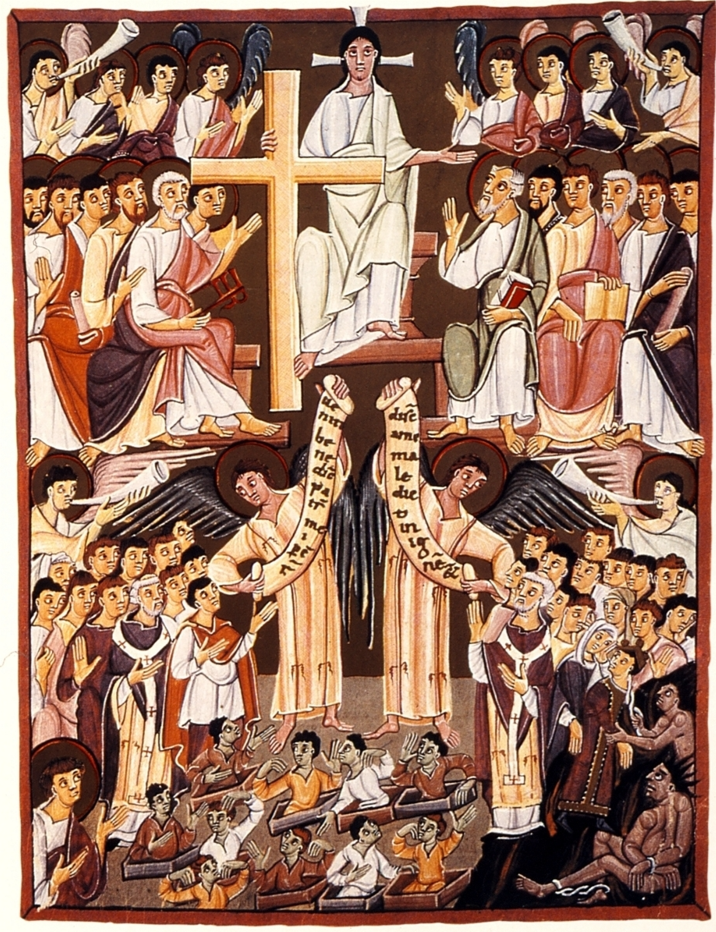What is life like when we change our mood from “imperative” or “subjunctive” and learn to live in the indicative?
If that question makes no sense to you, don’t worry – I’ll explain along the way.
I love language. I love learning new languages. I love the experience of connection with someone else’s insights, beautifully expressed – all the more so when the words bridge a gap of time and culture. In another life, I could have been a philologist, like Tolkien or Lewis.
I even love grammar. I’m grateful to my high school teachers, who placed such great emphasis upon it. It served me well later in life when I was wrestling with Latin or Greek or German. With my own writing, being grounded in grammar is not unlike the months of training that Daniel underwent with Mr. Miyagi in Karate Kid. Good grammar doesn’t make good writing, but it lays a sturdy foundation, without which creative expression will stagger and stumble.
During my many years of study, I had nine semesters of Latin and five of Greek. I answered hundreds of questions about declension and case, gender and number, tense and mood. My Latin Composition class in 1998 was at times a torture. Dr. Petruccione relentlessly and manically drove us through Bradley’s Arnold, always sporting a bowtie. Twice every week, we submitted our elaborate sentences, translated from English into Latin. If you missed one time, you dropped a letter grade. If you missed a single class, you dropped a letter grade. Late every Friday afternoon, I would wistfully watch my friends go to goof off, while I plodded off to class. The professor could tell that my mind was wandering, but could never catch me!
“And what mood is that, Mister Sakowski?” At the sound of my name, my distracted brain jolted to attention, frantically poring over the last 10 seconds. Somehow, I always come up with the answer. “Subjunctive!” He screwed up his face with a look of “I’ll get you next time!!” But he never did. What can I say? My body pays attention even when it’s not paying attention. I guess hypervigilance has its advantages.
What kind of overachieving college student enrolls in a challenging elective class on late Friday afternoons? The same kind, I suppose, as the high school student who spends four weeks of her high school summer vacation learning Latin, along with seven of her peers. In 1999 and 2000, home for the summer, I taught Latin upon the request of students at my alma mater. We had a blast.
Most of the students were highly competitive overachievers, but one struggled significantly. Honestly, he only passed because I found creative ways to give him points on his tests. It wasn’t hard, because he made up for his lack of Latin prowess with a wicked sense of humor. One section asked them to parse different words. I had to give him bonus points as I howled at his answers:
Person? Magister [“Teacher” – the name the students called me]
Tense? Very
Voice? Sometimes mumbles
Mood? Depends on the day…
As some of you know, verbs can have different “moods” – indicative, imperative, subjunctive, etc. The indicative mood describes or asks about matters of truth (what actually is, was, or will be the case). The imperative mood gives commands. The subjunctive mood expresses the “woulds” and “coulds” and “shoulds.”
When it comes to discipleship and morality, moods also matter! I’ve come to appreciate living in the indicative mood, rather than the imperative or the subjunctive. Eagerly pursuing the good is much more possible when we can tell the truth with kindness, when we can name particularly what actually is without judging it or pressuring it to be a different way. I wrote recently about this calm noticing and accepting of what is as a prerequisite for virtue.
I remember my early years as a pastor. I was overwhelmed and putting all kinds of pressure on myself. I had just returned from Rome, where I had been researching and learning in seven different languages in the writing of my doctoral thesis. Now I was shared as a pastor of two previously separate parishes, and ministering to the Latino community in the region. I had 5-6 Masses each weekend and felt impossibly pulled in three directions. I lived daily with a fear of failure and a felt trapped in powerlessness. No matter how many “shoulds” I checked of my list, it was never good enough – not for many of the people I was trying to serve and not for my harsh inner critic.
Those first several years, I wrote out my Spanish homilies. One memory that is clearer amidst the blur is my struggle to find effective ways in Spanish to translate “should.” That should say something about the content of my preaching at the time – both to others and to myself!
It was only a matter of time before present pressures and past unhealed wounds converged in an unbearable torrent. When I finally reached out for help, I found myself swept away on a journey of transformation that continues nine years later.
I definitely experienced a “mood change” along the way. I’ve been learning and re-learning the joy of living and relating in the indicative mood – accepting what is and engaging it with curiosity and kindness. Then deciding what to do.
Advice is overrated. It is exceedingly rare for me to tell people what to do. I’ve learned to be with, to notice, to point things out, or to pursue by asking curious questions – all in the indicative mood. When I show up that way, the others can tell that there is no judgment, no pressuring them to be a different way than they are now. They feel my genuine curiosity, wanting to get to know them, and delighting in them as they are now.
To those driven by moral imperatives or living in a “should” fortress, this approach seems madness. In their view, you have to get people to do the right thing, or you’re not being a good Christian. Can you feel the fear there?
How can we discern what is truly good if we don’t slow down, be with, and perceive what truly is? And how can we see what truly is when shame and fear are in the driver’s seat? They literally and figuratively narrow our field of vision.
I’ve learned to pay attention to what shame is up to. Where there’s contempt, there’s shame. When I notice self-contempt or other-contempt coming up, I get curious. I acknowledge the shame (if I don’t, the shame will power up even more!). But I ask if it’s ok to look at what actually is, setting aside judgment for the moment. Can I just be with you in what’s coming up now?
One would think that all the shaming and pressuring to do what you “should” would be a place of greater truth-telling, but it actually isn’t. When shame is talking, we utter strong-sounding and vague statements like “totally messed up” or “wacko” or “off the rails.” We speak in language of always or never, all or nothing, good guys and bad guys, us versus them. If we calm down and slow down, we can look more honestly at what is really happening – often surprised in the discoveries we make! Pretending like certain emotions aren’t there (or wishing they weren’t there) is not truth telling. Pretending like we can live reaction-less lives is not truth-telling. It’s dehumanizing.
Calming down and slowing down, wondering about what really is (even if it seems unglamourous or “bad”), also allows room for desire to breathe and grow.
Desire can take us places that shame never will. Some of you have seen Monsters, Inc. – the Pixar film about monsters fueling their power plant by capturing the fear of children. Then they make a revolutionary discovery – that laughter is far more powerful than fear. Similarly, desire for goodness is far more powerful than any amount of fear-mongering or “shoulding.” When Christians feel threatened, it seems like only fear and shame will get results. It is much messier to get down in the dirt and look up at what’s really going on. But that’s exactly what humility does.
When we humbly, calmly, curiously, kindly, and truthfully look at what is, we begin to see a much more truthful narrative. We start to see the ways in which deeper desire has been shamed, silenced, belittled, dismissed, or hemmed in. I find that shame is the loudest when desire feels vulnerable and exposed. Rather than allow desire (yet again) to be abandoned, betrayed, dismissed, or disappointed, shame will take over the controls. Setting down shame feels risky! But only then can desire be untethered to seek and find the good, and in finding it to desire it all the more.
What mood are you in today? Do you put pressure on yourself to be a certain way. Is your life one of “I should…” / “I just have to…”/ “I really need to…”? What would it cost you to dial down that pressure for a while, to be with a safe person, and to look at what is? You just might discover your deeper desires, and how your good Father is inviting you to soar.







